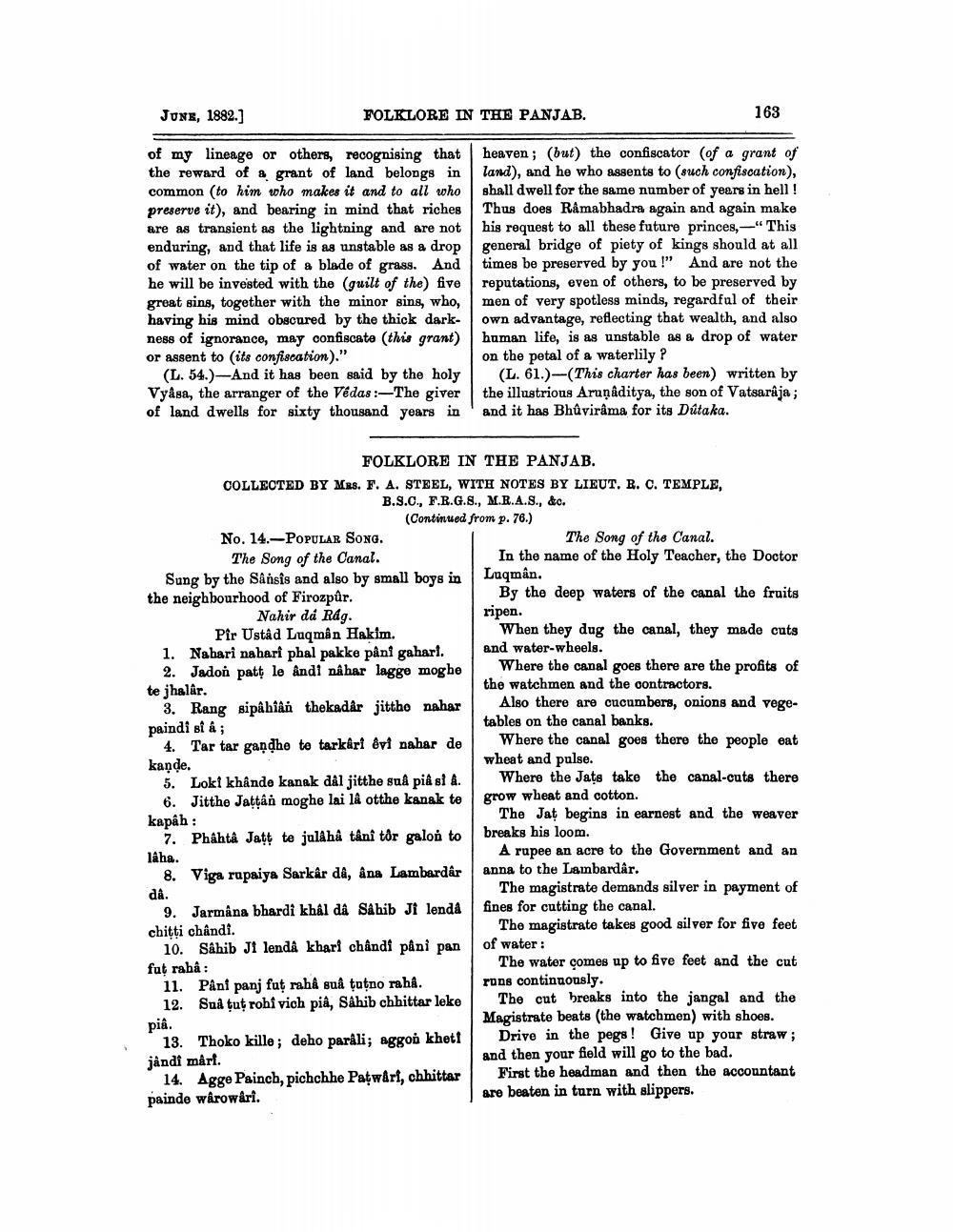________________
June, 1882.)
FOLKLORE IN THE PANJAB.
163
of my lineage or others, recognising that the reward of & grant of land belongs in common to him who makes it and to all who preserve it), and bearing in mind that riches are as transient as the lightning and are not enduring, and that life is as unstable as a drop of water on the tip of a blade of grass. And he will be invested with the (guilt of the five great sing, together with the minor sins, who, having his mind obscured by the thick darkness of ignorance, may confiscate (this grant) or assent to its confiscation)."
(L. 54.)-And it has been said by the holy Vyâsa, the arranger of the Vedas :-The giver of land dwells for sixty thousand years in
heaven; (but) the confiscator (of a grant of land), and he who assents to such confiscation), shall dwell for the same number of years in hell! Thus does Råmabhadra again and again make his request to all these future princes -"This general bridge of piety of kings should at all times be preserved by you!" And are not the reputations, even of others, to be preserved by men of very spotless minds, regardful of their own advantage, reflecting that wealth, and also human life, is as unstable as a drop of water on the petal of a waterlily?
(L. 61.)-(This charter has been) written by the illustrious Aruņaditya, the son of Vatsaraja; and it has Bhûvirâma for its Dútaka.
FOLKLORE IN THE PANJAB. COLLECTED BY MRS. F. A. STEEL, WITH NOTES BY LIEUT. R. C. TEMPLE,
B.S.C., F.R.G.S., M.R.A.S., &c.
(Continued from p. 76.) No. 14.- POPULAR SONG.
The Song of the Canal. The Song of the Canal.
In the name of the Holy Teacher, the Doctor Sung by the Sansis and also by small boys in Luqman. the neighbourhood of Firozpûr.
By the deep waters of the canal the fruits Nahir dd Rdg.
ripen. Pir Ustad Luqman Hakim.
When they dug the canal, they made cuts 1. Nahari naharf phal pakke påni gahari.
and water-wheels. 2. Jadon patt le andi nâhar lagge mogbe
Where the canal goes there are the profits of te jhalar.
the watchmen and the contractors. 3. Rang sipahian thekadar jittho nahar Also there are cucumbers, onions and vegepaindi si & ;
tables on the canal banks. 4. Tar tar gandhe to tarkari évi nahar de
Where the canal goes there the people eat kande.
wheat and pulse. 5. Loki khånde kanak dál jitthe suâ pie si a. Where the Jats take the canal-cuts there
6. Jitthe Jattan moghe lai lê otthe kanak te grow wheat and cotton. kapah :
The Jat begins in earnest and the weaver 7. Phâhâ Jatt te julâhâ tânî tôr galon to
breaks his loom. láha.
A rupee an acre to the Government and an 8. Viga rupaiya Sarkar da, ana Lambardár anna to the Lambardar.
The magistrate demands silver in payment of 9. Jarmâna bhardi khål då Sahib Ji lenda fines for cutting the canal. chitti chândi.
The magistrate takes good silver for five feet 10. Sahib Ji lendA khari chândi pâni pan of water: fut rabâ :
The water comes up to five feet and the cut 11. Pant panj fut rah suâ tutno raha. rons continuously.
12. Su tut rohi vich piâ, Sahib chhittar leke The cut breaks into the jangal and the piâ.
Magistrate beats (the watchmen) with shoes. 13. Thoko kille; deho paráli; aggon kheti Drive in the pegs! Give up your straw ; jandi márt.
and then your field will go to the bad. 14. Agge Painch, pichchhe Patwari, chhittar First the headman and then the accountant paindo warowári.
are beaten in turn with slippers.
dA.




